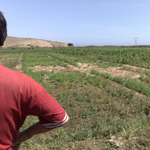An Arabic Radio Show, called ‘Flood Streams’ talks about different water-related topics aiming to spread awareness, and consists of multiple dialogues discussing the topic of the broadcasted episode, including interviewing youth (to measure their water knowledge), experts and people from the field; introducing the issue in an acting performance; interposing explanations and definitions between the show’s sections; sharing farmers’ experiences; and finally opening for a discussion inside the studio while hosting different stakeholders.
In episode 1, Modern irrigation is discussed to emphasize its importance in the water conservation process in one of the most water scarce countries worldwide. Modern irrigation systems are explained along with their techniques, benefits, true-life motives for using the method and their gains. Some good examples and results attained by locals are also presented.
In the meantime, the water situation is triggering a change from traditional irrigation systems, which Yemenis have always dealt with in their agricultural-dependent country for centuries, to modern irrigation systems and techniques to conserve the remaining water in the land.
More info:
http://spate-irrigation.org/wp-content/uploads/2014/04/OP12_ARAB_SE_Impact_ModernSI_Yemen.pdf
http://www.hydrology.nl/mainnews/1-latest-news/308-traditional-irrigation-systems-and-methods-of-water-harvesting-in-yemen.html
In this episode, episode 2, the discussion is around managing water resources and its uses cooperatively by locals. Local Water Management aims to resolve water conflicts arising among locals, ensure equal distribution of water in that area, study and apply improvements in the field…, etc. The formation of local associations, introducing societies to the importance of their roles in conserving water, studying new and efficient ways to irrigate, and more can be done by locals to prevent the water shortage and depletion threatening their groundwater and other water resources.
Spreading awareness of the local responsibility toward water and its consumption and conservation can downgrade the impact of its rising threat gazing at the next generations.
More info:
http://www.yemenwater.org/wp-content/uploads/2013/01/Local-groundwater-governance-in-Yemen-Hydrogeology-Journal.pdf
http://www.yemenwater.org/wp-content/uploads/2013/03/Fact-sheet-1.pdf
http://www.yemenwater.org/wp-content/uploads/2014/10/Building-On-Dhamar-Local-GW-Management.docx
In this episode, episode 3, Agricultural and Irrigation development which took place in Tihama plain and Wadi (Valley) Zabid is outlined. It also discusses how the idea was brought to life after people had suffered from flood issues demolishing their feeble man-made earthen barriers –built to slow down the flood’s flow –and ruining the lands/farms. Moreover, improving agriculture, its facilities and products; flood water distribution, as well as the livestock in the area along with the issues and challenges faced were also given a mention during this interview highlighting the role of the General Authority for the development of Tihama.
This episode is concentrated on talking about Tihama plain while only having one section, an elaborate interview, rather than the usual several sections per episode.
More info:
http://www.spate-irrigation.org/wordpress/wp-content/uploads/2011/06/Groundwater-development-in-the-Tihama-coastal-plain.pdf
http://arizona.openrepository.com/arizona/handle/10150/191691
In this episode, episode 4, Harvesting rain water from roads is discussed along with its ways and techniques. The discussion also carries in it the faced issues urging such a strategy to be implemented comprehensively to collect the water going unused to pour in the sea or desert after heavy rain seasons.
More info:
http://www.roadsforwater.org
http://www.hydrology.nl/mainnews/1-latest-news/308-traditional-irrigation-systems-and-methods-of-water-harvesting-in-yemen.html



